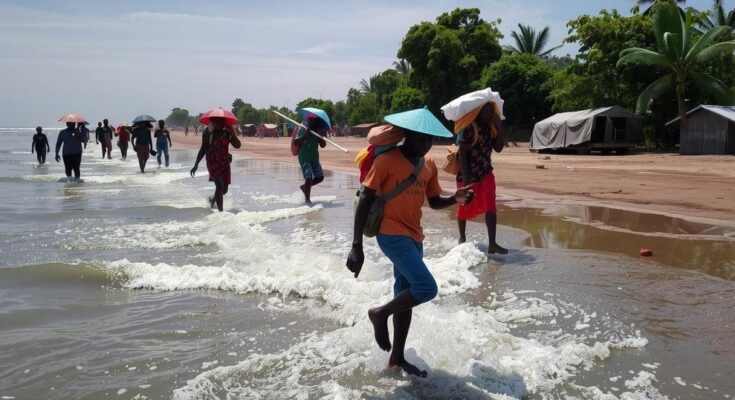Over 13,000 Mozambicans have fled to Malawi due to violence after a contested presidential election. The situation has strained resources, but organizations are mobilizing to assist those in need. Authorities are also planning to relocate asylum-seekers to better facilities as conditions remain challenging.
In recent weeks, approximately 13,000 Mozambicans have sought refuge in Malawi, fleeing violence resulting from the controversial presidential election held in October. The influx primarily includes women and children, and authorities anticipate that these numbers may increase as tensions persist.
Sofia Jimu, a traditional leader from the Tengani region of Mozambique, has shared her firsthand account of the dire conditions faced by evacuees, emphasizing the severe lack of food at the evacuation centers. “Three children collapsed because of hunger in just one day,” she noted, although assistance arrived the following day in the form of 150 bags of maize flour and four bags of beans for distribution.
Political tensions in Mozambique escalated after the Constitutional Council declared Daniel Chapo, the candidate from the ruling Frelimo Party, as the election winner. This decision has been contested by his rival, Venancio Mondlane of the opposition Podemos party. Monitoring group Plataforma Decide reports that over 200 fatalities have occurred since protests broke out due to the election results.
Dominic Mwandira, commissioner for Nsanje district in Malawi, has highlighted the challenges posed by limited resources available to assist the growing number of asylum-seekers. “In terms of food and then nonfood items, tents, issues of water, there are several,” he remarked. Nonetheless, he expressed optimism as assistance from various organizations, including the Malawi Red Cross Society and Plan International, is beginning to arrive.
Jane Mweziwina, a program area manager for Plan International in Malawi, affirmed their commitment to addressing the unique vulnerabilities of specific groups among the newcomers. “Women, people with disabilities, and children are always vulnerable in crises like this,” she stated, advocating for special considerations to be made regarding their accommodation and security.
The government of Malawi is currently developing plans to relocate asylum-seekers to a more suitable center. Meanwhile, the Department for Refugees and the United Nations High Commissioner for Refugees in Malawi are collaborating to assess the needs of these individuals.
The article addresses the humanitarian crisis in Malawi, stemming from the post-election violence in Mozambique. Following the disputed October presidential election, thousands fled to Malawi, with women and children constituting a significant portion of the refugee population. The escalating violence in Mozambique, resulting in numerous deaths, necessitated the urgent relocation of affected individuals, prompting Malawi to respond with necessary aid and refugee assessments.
In summary, the violence in Mozambique following the disputed October election has led to a significant influx of refugees into Malawi, with around 13,000 individuals seeking safety. Despite logistical challenges, local authorities and humanitarian organizations are mobilizing to provide essential support and resources. The situation remains fluid, with ongoing assessments to better cater to the needs of those affected, especially vulnerable populations such as women and children.
Original Source: www.voanews.com




